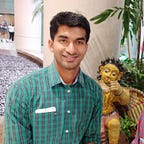Book Notes From Complications by Atul Gawande
Complications examines the uncertainties and complexities that doctors must grapple with as they go about treating their patients. Through various medical anecdotes, Dr. Gawande skillfully shines the light on the medical profession and raises some profound questions
Dr Atul Gawande wrote this book as a surgical resident and it arises from his experiences during eight years of training in general surgery.
Many of the anecdotes in the book unfold like suspense thrillers and keep you on the edge. Some of them are fascinating and some disturbing. Yet, each of them leaves you with an invaluable lesson.
The book is divided into three sections:
- Section 1 examines the fallibility of doctors. It discusses how a novice doctor learns to wield a knife, what a good doctor is and how could a good doctor go bad.
- Section 2 focusses on mysteries and unknowns of medicines and the struggles that ensue as a result. It highlights stories of an architect with an incapacitating back pain in whom no physical explanation could be found, a television newscaster whose blushing became so severe that she could no longer function in her job.
- Section 3 focusses on uncertainty itself — how much in medicine doctors know and how much doctors don’t. And how doctors might grapple with this ignorance more wisely.
Here are my notes from the book.
On Doctors
- Doctors are often filled with uncertainties. Information is inadequate, science is unambiguous, one’s knowledge & abilities are never perfect. (Possibilities and probabilities is all you have to work with in medicine)
- All doctors make terrible mistakes at some point or the other. Yet, doctors must shun either of the two negative attitudes —1) self doubt and 2)denial. Instead, the attitude that is inculcated among surgeons is that of “correctional” view of mistakes — What would do a doctor have done differently.
- In a world where computer algorithms could be superior in a comparison to human judgement, doctors would still continue to play a pivotal role. While technology might be better at diagnosing the problem but doctors will still be needed to heal.
- In one of the chapters, a profound question is raised — Who has the ultimate decision making authority when it comes to life threatening illnesses. While the general view is that patients are the ultimate decision makers, yet doctor’s can steer patients to do what’s right for themselves. Doctors can help in better decision making as they are less emotionally charged and have the benefit of ‘group rationality’.
On attaining skill and Expertise
- Skill and confidence are learned through experience and deliberate practice — often haltingly and humiliatingly.
- Skills can be taught but tenacity cannot. Repeat studies of elite performers has shown that the difference between them and lesser performers is the cumulative amount of deliberate practice they have had. Most important talent is the talent for practice.
On reducing errors
- Why algorithms are better at diagnosis than humans —1)Human beings are inconsistent and are easily influenced by suggestion, recent experience, suggestion etc. 2) Human beings are not good at simultaneously considering multiple factors.
- To reduce chances of error, there are some important things to keep in mind: 1)Focus on process and not the individual (major errors are usually a lot of small things gone wrong) — Standardizing processes greatly reduces the chances of error. 2) Open, honest reporting is crucial: Federal Aviation Administration has a formalized system for analyzing and reporting dangerous aviation incidents, and it has had enormous success in improving airline safety.
While taking about the uncertainties and challenges faced by Doctors, the book also helps introduces us to some interesting medical concepts:
- Psychology of pain — How factors such as mood, gender and beliefs influence the experience of pain.
- Blushing — The science behind it.
- Why do we eat so much fatty food
- Autopsies — How they are done and how they act as a tool of discovery and advancing medical knowledge.
Conclusion
Overall, this is a worthy read that helps you understand the unenviable task of savings lives that Doctors encounter every day and the complications that arise as a result. Highly recommended for everyone who is enthusiastic about the medical profession in general!
